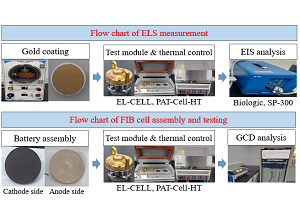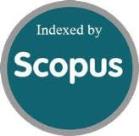Investigation of Cycling Performance in a Solid-State Fluoride-Ion Battery Based on Copper Fluoride Electrodes
DOI:
https://doi.org/10.46604/ijeti.2024.13297Keywords:
fluoride-ion battery, copper fluoride, cycling performance, solid-state batteryAbstract
This study investigates the performance and cycling fading of a solid-state fluoride-ion battery (FIB) based on the CuF2 electrode. The cathode and solid electrolyte of CuF2 composite and La0.9Ba0.1F2.9 are prepared by ball-milling. Meanwhile, the anode materials are used as Sn and Pb. All FIB cells with sandwich structures are fabricated by compressing under a pressure of 4.5 tons/cm2. Electrochemical measurements of discharge/charge are performed at 423 K and under 40 μA/cm2. The resultant cycling stability of the cell with the Pb anode is higher than that of the cell with the Sn anode. Concerning the cell with Pb anode, the first and tenth discharge capacities of 150 and 90 mAh/g are obtained. X-ray photoelectron analysis demonstrates that the cycling fading of the cell with the Sn (or Pb) anode may be attributed to the irreversible formation of materials (e.g., SnF4 or PbF4) during the electrochemical reaction.
References
M. A. Nowroozi, I. Mohammad, P. Molaiyan, K. Wissel, A. R. Munnangi, and O. Clemens, “Fluoride Ion Batteries – Past, Present, and Future,” Journal of Materials Chemistry A, vol. 9, no. 10, pp. 5980-6012, March 2021.
A. Vamsi, J. Ansari, S. Mk, C. Pany, B. John, A. Samridh, et al., “Structural Design and Testing of Pouch Cells,” Journal of Energy Systems, vol. 5, no. 2, pp. 80-91, June 2021.
M. S. Alam, R. K. Pillai, and N. Murugesan, Developing Charging Infrastructure and Technologies for Electric Vehicles, Hershey PA: Engineering Science Reference, pp. 156-177, 2022.
L. Liu, L. Yang, M. Liu, X. Li, D. Shao, K. Luo, et al., “SnF2-Based Fluoride Ion Electrolytes MSnF4 (M = Ba, Pb) for the Application of Room-Temperature Solid-State Fluoride Ion Batteries,” Journal of Alloys and Compounds, vol. 819, article no. 152983, April 2020.
C. Pany and G. Li, “Editorial: Application of Periodic Structure Theory With Finite Element Approach,” Frontiers in Mechanical Engineering, vol. 9, article no. 1192657, 2023.
L. Zhang, M. A. Reddy, and M. Fichtner, “Development of Tysonite-Type Fluoride Conducting Thin Film Electrolytes for Fluoride Ion Batteries,” Solid State Ionics, vol. 272, pp. 39-44, April 2015.
M. A. Reddy and M. Fichtner, “Batteries Based on Fluoride Shuttle,” Journal of Materials Chemistry, vol. 21, no. 43, pp. 17059-17062, November 2011.
I. Mohammad, R. Witter, M. Fichtner, and M. A. Reddy, “Room-Temperature, Rechargeable Solid-State Fluoride-Ion Batteries,” ACS Applied Energy Materials, vol. 1, no. 9, pp. 4766-4775, September 2018.
C. Rongeat, M. A. Reddy, R. Witter, and M. Fichtner, “Solid Electrolytes for Fluoride Ion Batteries: Ionic Conductivity in Polycrystalline Tysonite-Type Fluorides,” ACS Applied Materials & Interfaces, vol. 6, no. 3, pp. 2103-2110, February 2014.
H. Bhatia, D. T. Thieu, A. H. Pohl, V. S. K. Chakravadhanula, M. H. Fawey, C. Kübel, et al., “Conductivity Optimization of Tysonite-Type La1–xBaxF3–x Solid Electrolytes for Advanced Fluoride Ion Battery,” ACS Applied Materials & Interfaces, vol. 9, no. 28, pp. 23707-23715, July 2017.
I. Mohammad, R. Witter, M. Fichtner, and M. A. Reddy, “Introducing Interlayer Electrolytes: Toward Room-Temperature High-Potential Solid-State Rechargeable Fluoride Ion Batteries,” ACS Applied Energy Materials, vol. 2, no. 2, pp. 1553-1562, February 2019.
F. Preishuber-Pflügl, V. Epp, S. Nakhal, M. Lerch, and M. Wilkening, “Defect-Enhanced F–ion Conductivity in Layer-Structured Nanocrystalline BaSnF4 Prepared by High-Energy Ball Milling Combined With Soft Annealing,” Physica Status Solidi (C), vol. 12, no. 1-2, pp. 10-14, January 2015.
J. Wang and C. Ma, “Superior Room-Temperature Cycling Stability of Fluoride-Ion Batteries Enabled by Solid Electrolytes Synthesized by the Solid-State Reaction,” Science China Materials, vol. 65, no. 11, pp. 3025-3032, November 2022.
D. T. Thieu, M. H. Fawey, H. Bhatia, T. Diemant, V. S. K. Chakravadhanula, R. J. Behm, et al., “CuF2 As Reversible Cathode for Fluoride Ion Batteries,” Advanced Functional Materials, vol. 27, no. 31, article no. 1701051, August 2017.
M. A. Nowroozi, K. Wissel, M. Donzelli, N. Hosseinpourkahvaz, S. Plana-Ruiz, U. Kolb, et al., “High Cycle Life All-Solid-State Fluoride Ion Battery With La2NiO4+d High Voltage Cathode,” Communications Materials, vol. 1, article no. 27, 2020.
L. Zhang, M. A. Reddy, and M. Fichtner, “Electrochemical Performance of All Solid-State Fluoride-Ion Batteries Based on Thin-Film Electrolyte Using Alternative Conductive Additives and Anodes,” Journal of Solid State Electrochemistry, vol. 22, no. 4, pp. 997-1006, April 2018.
J. Liu, L. Yi, X. Chen, D. Li, S. Ni, J. Xia, et al., “Studies on Fluoride Ion Conductivity of the Mechanochemically Synthesized β-KSbF4 for All-Solid-State Fluoride-Ion Batteries,” Sustainable Materials and Technologies, vol. 39, article no. e00810, April 2024.
Y. Yu, M. Lei, D. Li, and C. Li, “Near-Room-Temperature Quasi-Solid-State F-Ion Batteries With High Conversion Reversibility Based on Layered Structured Electrolyte,” Advanced Energy Materials, vol. 13, no. 12, article no. 2203168, March 2023.
B. D. Cullity, Elements of X-Ray Diffraction, Pearson New International Edition, 3rd ed., United Kingdom: Pearson, 2014.
A. Wieczorek, H. Lai, J. Pious, F. Fu, and S. Siol, “Resolving Oxidation States and X–site Composition of Sn Perovskites Through Auger Parameter Analysis in XPS,” Advanced Materials Interfaces, vol. 10, no. 7, article no. 2201828, March 2023.
P. C. Hsu, C. J. Hsu, C. H. Chang, S. P. Tsai, W. C. Chen, H. H. Hsieh, et al., “Sputtering Deposition of P-type SnO Films with SnO2 Target in Hydrogen-Containing Atmosphere,” ACS Applied Materials & Interfaces, vol. 6, no. 16, pp. 13724-13729, August 2014.
J. Liu, L. Yi, P. Zeng, C. Zou, X. Chen, X. Tao, et al., “Point Defect Engineering Enabled the High Ionic Conductivity of BaSnF4 for Solid-State Fluoride-Ion Batteries at Room Temperature,” Energy & Fuels, vol. 36, no. 24, pp. 15258-15267, December 2022.
M. Senna, E. Turianicová, V. Sepelák, M. Bruns, G. Scholz, S. Lebedkin, et al., “Fluorine Incorporation Into SnO2 Nanoparticles by Co-milling With Polyvinylidene Fluoride,” Solid State Sciences, vol. 30, pp. 36-43, April 2014.
H. Cai, Y. Sun, X. Zhang, L. Zhang, H. Liu, Q. Li, et al., “Reduction Temperature-Dependent Nanoscale Morphological Transformation and Electrical Conductivity of Silicate Glass Microchannel Plate,” Materials, vol. 12, no. 7, article no. 1183, April 2019.
H. Konishi, T. Minato, T. Abe, and Z. Ogumi, “Charge and Discharge Reactions of a Lead Fluoride Electrode in a Liquid-Based Electrolyte for Fluoride Shuttle Batteries:-The Role of Triphenylborane as an Anion Acceptor-,” ChemistrySelect, vol. 4, no. 19, pp. 5984-5987, May 2019.
A. Grenier, A. G. Porras-Gutierrez, M. Body, C. Legein, F. Chrétien, E. Raymundo-Piñero, et al., “Solid Fluoride Electrolytes and Their Composite With Carbon: Issues and Challenges for Rechargeable Solid State Fluoride-Ion Batteries,” The Journal of Physical Chemistry C, vol. 121, no. 45, pp. 24962-24970, November 2017.
L. Liu, L. Yang, D. Shao, K. Luo, C. Zou, Z. Luo, et al., “Nd3+ Doped BaSnF4 Solid Electrolyte for Advanced Room-Temperature Solid-State Fluoride Ion Batteries,” Ceramics International, vol. 46, no. 12, pp. 20521-20528, August 2020.

Published
How to Cite
Issue
Section
License
Copyright (c) 2024 Chien-Hung Chen, Ching-Tsung Yu, Yu-Fei Chang

This work is licensed under a Creative Commons Attribution-NonCommercial 4.0 International License.
Copyright Notice
Submission of a manuscript implies: that the work described has not been published before that it is not under consideration for publication elsewhere; that if and when the manuscript is accepted for publication. Authors can retain copyright in their articles with no restrictions. Also, author can post the final, peer-reviewed manuscript version (postprint) to any repository or website.

Since Jan. 01, 2019, IJETI will publish new articles with Creative Commons Attribution Non-Commercial License, under Creative Commons Attribution Non-Commercial 4.0 International (CC BY-NC 4.0) License.
The Creative Commons Attribution Non-Commercial (CC-BY-NC) License permits use, distribution and reproduction in any medium, provided the original work is properly cited and is not used for commercial purposes.







.jpg)


